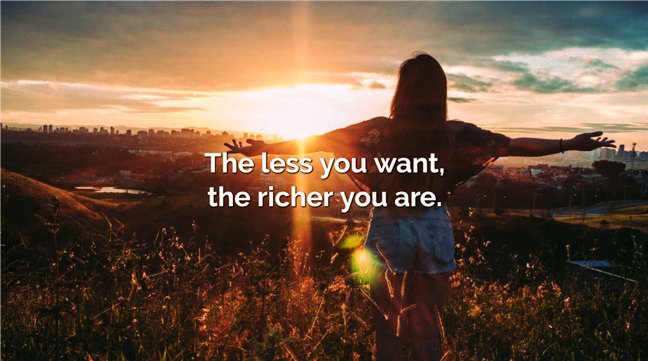|
|

The Less You Want, The Richer You Are
-- Overcoming Consumerism
by Frank Schaefer

PowerPoint Presentation
Video
on Consumerism
Scripture Readings:
Hebrews 13:5-6 (MSG)
Don't be obsessed with getting more material things. Be relaxed with what you
have. Since God assured us, "I'll never let you down, never walk off and leave
you," we can boldly quote: "God is there, ready to help; I'm fearless no
matter what. Who or what can get to me?"
Matthew 6:19-21 (NASB)
Do not store up for yourselves treasures on earth, where moth and rust
destroy, and where thieves break in and steal. But store up for yourselves
treasures in heaven, where neither moth nor rust destroys, and where thieves
do not break in or steal; for where your treasure is, there your heart will be
also.
Message: The Less You Want, The Richer You Are --
Overcoming Consumerism
If I were to ask people about what Lent means, what answers would I get?
Sinfulness - Do a Fast or Give up something - Pray/Meditate - Wilderness - 7
deadly sins
Today's message is about some of these themes. 1. It's about sin,
specifically the sin of gluttony or consumerism and 2. it's a bout giving up
something for Lent, something we don't need to begin with, to help save the
environment and for our own spiritual growth.
1. Sin - Most of us living in the first world, we are gluttons. We are
committing the sin of consumerism every day. The Greeks fully grasped the high
costs of passionate excess. The idea of avoiding excess was a prime ingredient
in a life worth living. They correctly understood that when people violate the
limits of a reasonable mean, they pay penalties ranging from frustrations to
utter catastrophe. It is for this reason that they prized ideals such as
measure, balance, harmony, and proportion. So, moderation was considered a
solution to life's problems. (1)
Why is excessive living or "consumerism" so bad? Well, it means that relatively
few people in this world are taking more than they need and waste the excess.
Have you ever seen someone in line at the buffet in the cafeteria and put so
much food on their plate that they couldn't eat it and then threw the excess in
the trash? What a waste of perfectly good food in the face of world hunger.
Did you know that consumerism is a major contributor to climate change? And yet
we continue to buy and horde and waste. In the words of William Wallace: Our
obsession with consumption means that we have become the future-eaters,
swallowing up the future of generations yet unborn (2)
According to Carlo Orecchia and Pietro Zoppoli in their important research on
Consumerism and Environment, "Consumption can affect the environment in many
ways: higher levels of consumption (and therefore higher levels of production)
require larger inputs of energy and material and generate larger quantities of
waste by products. Increased extraction and exploitation of natural resources,
accumulation of waste and concentration of pollutants can damage the environment
and, on the long run, limit economic activity." (3)
2. Give something up for Lent: Avoid Excess. Live life in harmony and
balance.
Why do I always want more things? What motivates me
to always keep spending myself into debt? What motivates me to never be
satisfied with what I have? What motivates me to keep wanting more and more and
more? Play video
Society tells us: Having things is everything. But Jesus tells us: you got to
supersize your Life. The most important things in life aren't things at all.
[Play Video]
Three cultural misconceptions: Having more things will make us...
1. more happy 2. more important 3. more secure
Misconception #1 - Having more things will make us more happy.
Things can bring happiness. The problem is, it's
temporary. It's just for a while. If you get a gift, you're happy about it. But
it doesn't last and after a while the thrill goes away and the excitement fades.
"He who loves money shall never have enough. The
foolishness of thinking that wealth brings happiness! The more you have, the
more you spend." Eccl. 5:10-11
Deep down, we really don't want more things, more
toys, more cars, we want what they can bring us! We want to feel content,
accepted, loved, whole!
Misconception #2 - Having more things will make me more important.
The misconception is, I am what I own, that my valuables determine my value,
that if I have little then I must be worth little. So since I want to be liked
and respected and looked up to, I must continually keep on getting more and
more.
Fact is, many people buy things they don't need with
money they don't have to impress people they don't even like! That does not make
sense.
"Be on your guard against greed in any shape or
form. For a man's real life in no way depends on the number of his possessions."
Don't confuse your net worth with your self worth." Luke 12:15
Misconception #3 Having more things will make me
more secure.
"If I could just achieve financial independence..." Have you heard that one? As
if that's the goal of life.
Fact is, the more you have, the more insecure you
can be because the more you have to worry about. The more you have, the more
time and energy it takes to maintain it. The more you have, the more insurance
you have to pay to insure it. I never worry about the barnacles on my yacht -
cause I don't have a yacht.
Truth is that the less you have, the less you have to worry about.
Proverbs 18:11: "The rich man thinks of his wealth as an impregnable defense,
a high wall of safety. What a dreamer!"
Truth is, real security can only be found when you
place your security in something that can't be taken away from you. Jesus says
we must focus on permanent values. On things that really matter, that really
count, which aren't material things at all.
Here is another William Wallace quote: "When you
discover the gold within your soul, the whole world becomes golden. You are no
longer obsessed with the desire to own or consume but are simply content to be
aware (4)"
And as you meditate on these principles and verses,
you will discover for yourself that ...
the less you want, the richer you are.
What are you willing to give up for Lent?
What are you willing to give up for the environment?
What are you willing to give up for your own spiritual growth?
________
(1) Solon's prescription "Nothing in Excess" (6th Century B.C.)
(2) by William L. Wallace form the Lent Festive Worship Collection, Progressive
Christianity.org
(3) Carlo Orecchia, Pietro Zoppoli, Consumerism and Environment: Does
Consumption Behaviour Affect Environmental Quality? 2007
(4) by William L. Wallace form the Lent Festive Worship Collection, Progressive
Christianity.org
|
|